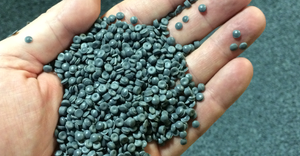German Researchers Develop New Technology for Sorting Black Plastics
In Germany, researchers at the Fraunhofer Institutes for High Frequency Physics and Radar Techniques FHR in Wachtberg, Optronics, System Technologies and Image Exploitation IOSB and Intelligent Analysis and Information Systems IAIS have developed blackValue, a new technology that can sort black plastics by type.
Currently, Germany produces 5.7 million tons of plastic refuse each year. Roughly 42 percent of that gets reused and the rest gets sent to waste incineration plants to be converted into energy. With this new technology, Germany will be able to increase its amount of plastic that gets reused.
Phys.org has more details on this new technology:
Recycling black plastics, such as those found in car instrument panels, used to be impossible because their absorption properties made them simply invisible to typical analysis systems. But Fraunhofer researchers have developed a new technology that can sort black plastics according to type – and at affordable prices.
Shopping at the supermarket inevitably results in a trash bin overflowing with plastic refuse. Whether it's juice, meat, fruit, or other food items, it's all packaged in plastic. The quantities are enormous – Germany alone produces roughly 5.7 million tons of it each year. Although the majority of people conscientiously put these packaging into their yellow recycling bins, only about 42 percent of the waste gets "reincarnated" as diapers, fleece pullovers, stuffed animals, and the like. The rest is sent to waste incineration plants, where it is converted into energy. Black plastics in particular suffer this fate because it has thus far been impossible to sort them by material type. Conventional sorting systems operate specifically within the near-infrared range, which in general allows them to categorize plastics. But what works especially well for most plastics fails for black ones: the soot that gives them their dark color absorbs most of the signal, so the optical system cannot see these substances. At the same time, the need to recycle these dark plastics has become more urgent, because any efforts to meet the EU thresholds for car recycling programs will have to include black plastics.
About the Author
You May Also Like


